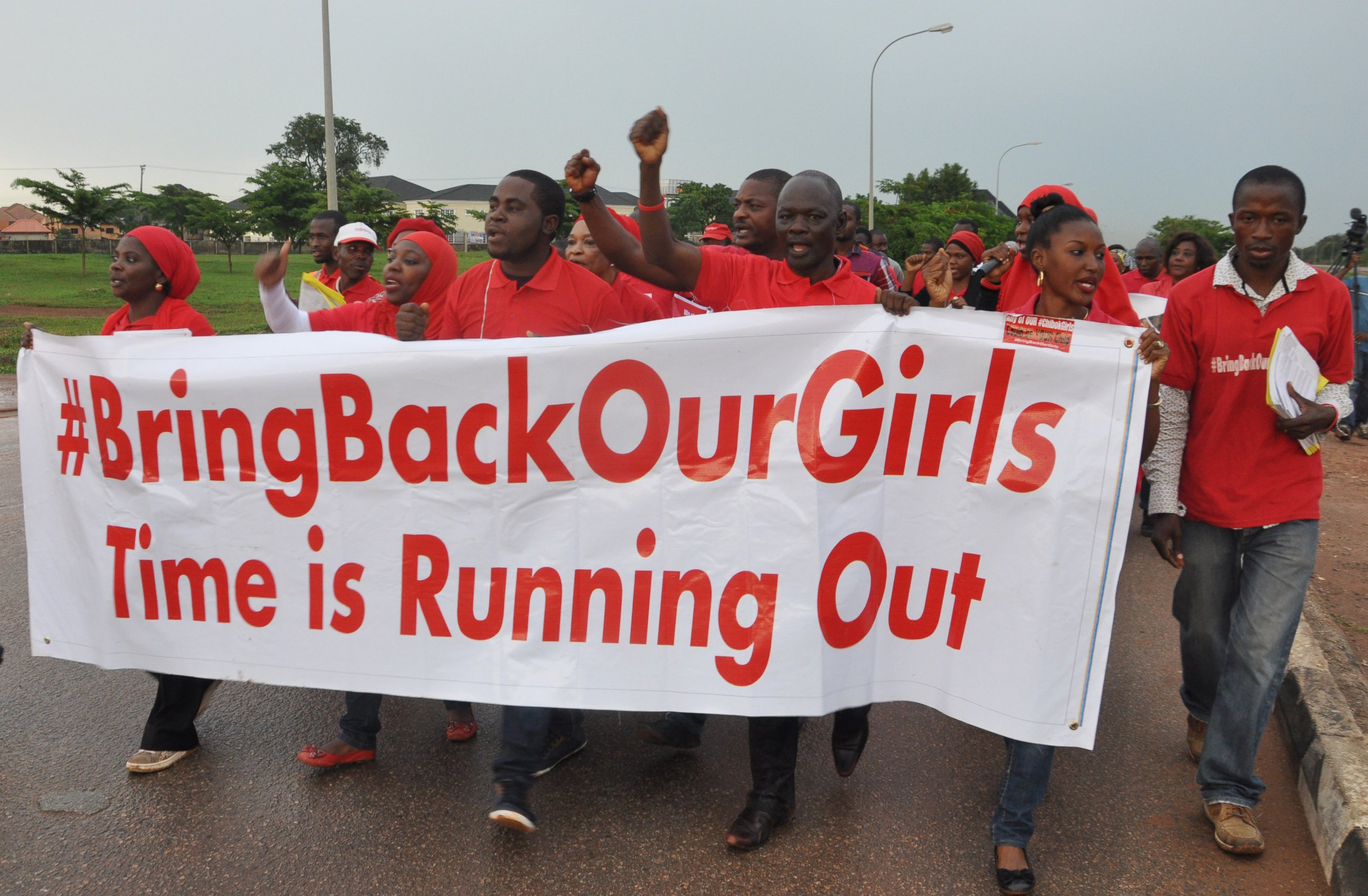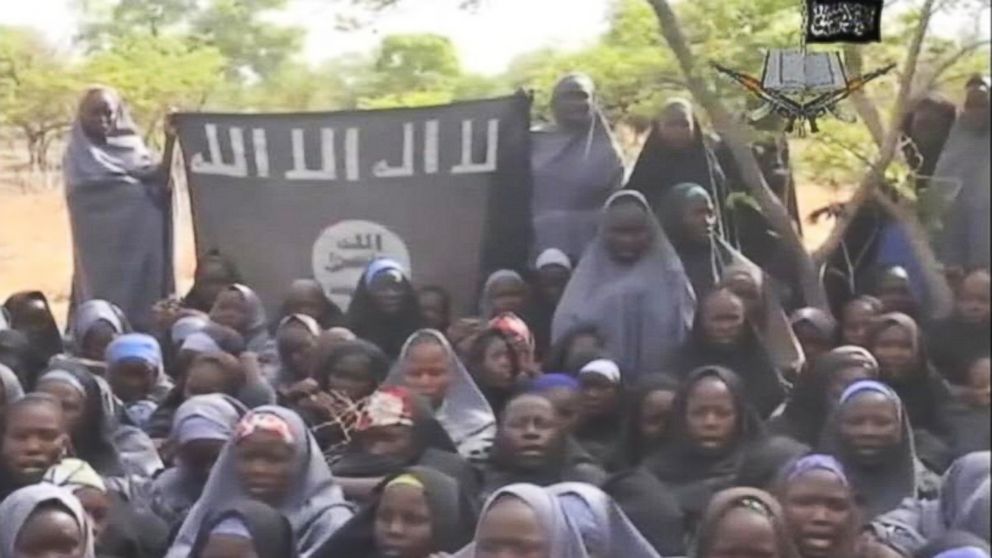#BringBackOurGirls: One Year Later, Girls Who Escaped Speak Out
One year after their kidnapping, Nigerian girls who escaped are still learning.
— -- When Boko Haram militants kidnapped nearly 300 young girls from their school in northeastern Nigeria last year, international outrage fueled a social media campaign calling for their release.
But as the #BringBackOurGirls movement picked up momentum before ultimately fading from the international spotlight, several of the young women who managed to escape their kidnappers found a different way to fight back.
“Western education, I think is to me, is what makes me what I am today,” said "Mary," one who was able to escape. “I can achieve my ambitions and then win back my community and help my people.”
Three of the girls who escaped the kidnapping agreed to be interviewed by ABC News under the condition their names not be released to protect their families.
They are now attending the American University of Nigeria, earning a western-based education, a strong message considering “Boko Haram” itself translates to “Western education is forbidden.”
“I remember vividly the meeting in my office in May when someone said, we are a development university, what are we going to do about the ones who escaped?” said Dr. Margee Ensign, the university’s president. “We thought about it and realized, while the world's attention is on the ones who were kidnapped, as it should be, and while we couldn't do anything about the 300 or so, we might be able to help some of the ones who escaped.”
Ensign eventually found a place for 21 of the 58 girls who had escaped at the university.
“They're making amazing progress every day, and they're a reminder to me of how education transforms lives,” Ensign told ABC News. “They play sports, they play volleyball, they're running, they're learning how to swim. Most importantly, their whole goal is to get an education, to get a career, and go back and rebuild Chibok.”
Chibok is the town where Boko Haram militants kidnapped the girls just as they were preparing to take exams.
One year later, 219 of the girls are still missing, and Boko Haram has turned the northern region of Africa’s most populated country into a terror playground.

Headlines of mass kidnappings and deadly attacks on villages have become commonplace.
Chibok is now uninhabited, save for a couple of parents who live in the forest around it and visit their old homes periodically, Ensign said.
According to a report released by UNICEF Monday, more than 1.5 million people, including 800,000 children, have fled their homes as a result of the onslaught from Boko Haram.
A separate report recently released by Amnesty International claims at least 2,000 women and girls have been abducted by the terror group since the start of 2014.
“I'm not angry with [Boko Haram] because according to my own knowledge, they said education is not important,” said "Blessing," a 17-year-old. “So they don’t know what they’re doing. I also pray that one day they might know the truth, and change.”
Ensign said many of her students were recently asked if they had “hate” towards Boko Haram.
“It was really moving--they said, 'No, we forgive them,'” Ensign said. “They said [Boko Haram] is uneducated, they're poor, they've been brainwashed. That’s [the girls’] perspective, which I find quite remarkable based on what they've lived through themselves.”
Despite help from the U.S. and other countries in last year’s search, there have been little more than rumored sightings of the girls’ missing classmates. Nigeria’s president-elect Muhammadu Buhari said in a statement Tuesday that he “cannot promise that we can find them.”
UNICEF’s Monday report pointed to evidence that many of the young girls and women taken by Boko Haram are being subjected to forced marriage, forced labor and rape.

“I have hope that they’re alive,” Ensign said. “I think it's going to take some time to see and find them. But as the government and the army begin to make more progress with Boko Haram, I think we're all hopeful that they will be found.”
Ensign said the one-year anniversary will be “tough” for the girls at her university. Two of the girls’ fathers were murdered just over Christmas break by Boko Haram.
“They have a very strong faith, and when you talk to them they will say they know they are being protected,” Ensign said. “We've offered them trauma counseling, all sorts of counseling to assist them. But again, they've told us that they want to stay together as a community.”
Both "Mary," a 17-year-old, and "Deborah," a 19-year-old, told ABC News they hope to become a doctors once they graduate from AUN and return to Chibok.
According to Ensign, however, a massive reconstruction effort will need to take place in the country’s northeast before that can happen.
In a short trip just last week to several towns north of her university, Ensign said Boko Haram had left behind massive devastation, destroying churches, mosques and schools.
It’s caused a massive surge of refugees, as many as 270,000, to crowd into the town of Yola, where the university is located. Ensign has spent the past week in Washington, D.C., seeking to raise funds for the school and to help the refugees, as well as rally for the international community’s support in rebuilding infrastructure in the north, so the refugees can return home.
“I'm really hoping that the US, the UN and the EU, the Brits come in now because there's a real opportunity,” Ensign said. “There's a huge void. And that means there's an opportunity to rebuild this part of the country that's so important and make sure people have the basics of life: food and education and health care.”
The school’s community, including the girls who escaped, have become involved in efforts to care for the displaced, Ensign said, as some begin to take their spring exams.
“This life is all about a struggle, falling and then getting up, meeting disappointment and then meeting with blessings all the time,” Deborah said. “But what I want the people to understand is first off, whatever kind of hardship or situation you're getting in to, just put your trust in God and then believe that He is going to save you.”
Watch the ABC News digital original video above to hear directly from the girls.
To learn more about the American University of Nigeria Foundation’s efforts, visit AUNF.org.




